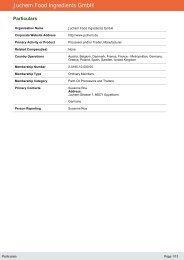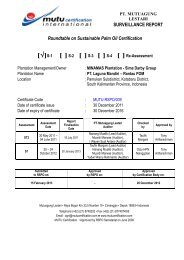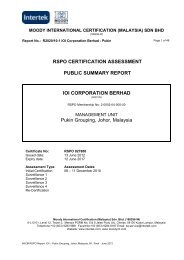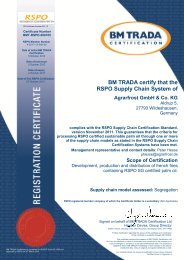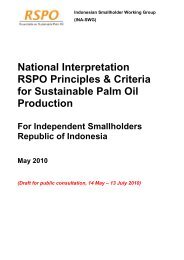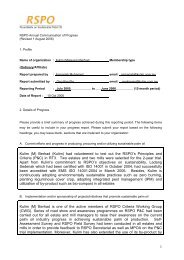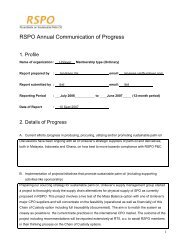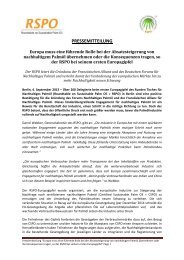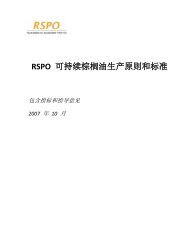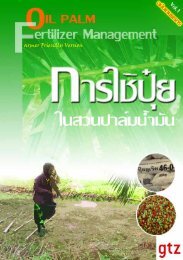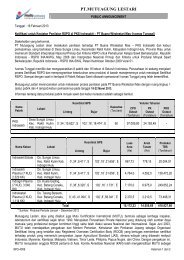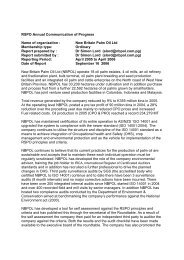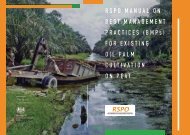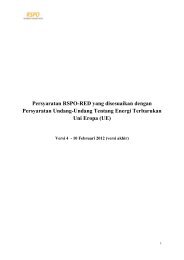RSPO CERTIFICATION ASSESSMENT PUBLIC SUMMARY REPORT
RSPO CERTIFICATION ASSESSMENT PUBLIC SUMMARY REPORT
RSPO CERTIFICATION ASSESSMENT PUBLIC SUMMARY REPORT
You also want an ePaper? Increase the reach of your titles
YUMPU automatically turns print PDFs into web optimized ePapers that Google loves.
Criterion 4.6<br />
Agrochemicals are used in a way that does not endanger health or the environment. There is<br />
no prophylactic use of pesticides, except in specific situations identified in national Best<br />
Practice guidelines. Where agrochemicals are used that are categorised by the World Health<br />
Organization as Types 1 A or 1 B, or are listed by the Stockholm or Rotterdam Conventions,<br />
growers are actively seeking to identify alternatives and this is documented.<br />
There is a List of pesticides used and pesticides stocks is listed in the”Balance Stock Agrochemical in<br />
2008, 2009, 2010”., such as : Ally 20 WDG (active ingredient : Metil metsulfuron), Roll Up 480 SL<br />
(Isopropil amina glyphosat), those can be bought for application are in accordance with the<br />
Permentan No 1/2001, WHO and Rotterdam convention, are issued and distributed to Procurement<br />
division. Only procurement division can buy and supply the materials. PTTN has a procedure on how<br />
to apply agrochemicals, refers to Peraturan Menteri Pertanian No. 07/Permentan /SR.140/ /2007, or<br />
Regulation No. 07/ Permentan /SR.140/ 2/2007 Ministry of Agriculture Republic of Indonesia.. All the<br />
agrochemicals used are registered and approved by Pusat Perizinan dan Investasi Sekretariat<br />
Jenderal Departemen Pertanian 2008, or Invesation and Permit Center, Agriculture Department,<br />
Republic of Indonesia. Checks on records show that the pesticide use (including active ingredients<br />
used, area treated, amount applied per ha and number of applications) is appropriate for the target<br />
species, given at correct dosage and applied by trained personnel in accordance with the product label and<br />
related SOP/ Working Instruction.<br />
PTTN has established procedure to handling hazardous agrochemicals, and provide facilities and<br />
proper PPE for workers who have contact with agrochemicals, including field sprayers, fertilizer applicators,<br />
warehouse helper and chemical mixer. However, it was found that MSDS of Rollixone in Agrochemical<br />
Warehouse at Payabaung Estate, and also for other MSDS, indicated that there must be shower<br />
water and soap available if emergency situation happened. The shower water was available, but it<br />
didn’t work and there was no soap available in place. The facility doesn’t provide bin for hazardous<br />
wastes, sand, and fabric cotton waste as required by SOP/PBNE/LBH (Rev.00, dated 01.07.2011. A<br />
Major non-compliance was issued. (See NCR T-08.07/2011).<br />
PTTN also established procedure for handling hazardous agrochemicals spills and only trained<br />
persons for pesticide application technique are permitted and instructed for pesticides application in<br />
the field. However, it was found Working instruction regarding handling of hazardous agrochemicals<br />
spill (SOP /PBE/LBH (Rev,00, 1 Juli 2010) was not available in Agrochemical Warehouse of<br />
Payabaung Estate. MSDS for agrochemicals are translated into Bahasa Indonesia, however, the<br />
warehouse helper didn’t understand the meaning. Symbol of hazardous chemicals was not in<br />
apropriate manner and the person in charge who handle agrochemicals found has not enough<br />
competence in his job, i.e MSDS, symbol, and working instruction. A Major non-compliance was<br />
issued. (See NCR T-09.07/2011).<br />
Waste material from agrochemicals including pesticides containers were collected by licensed contractor<br />
and the records of hazardous waste manifest were well maintained. PTTN has a plan to return the<br />
waste container to the vendor and the mutual agreement has been signed.<br />
Checks on the records of agrochemicals used found that they complied with the regulation. Usage of<br />
paraquat in 2008, 2009, and 2010 is reduced. Regular training/ socialization for chemical sprayers<br />
was conducted. There was evidence of regular medical check-ups for workers involved in handling<br />
hazardous chemicals. PTTN has policy that pregnant and breast-feeding women are prohibited from<br />
working with pesticides, and there are records of socialization of the policy to the female workers.<br />
Compliance Status : Not Compliant..<br />
Public Summary Report PT.Tapian Nadenggan –Langga Payung Mill Page 25



